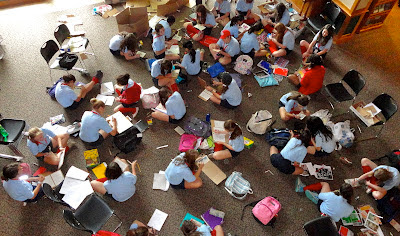Interlochen: Intuition vs. Instruction
It’s been a little over a week since I received the challenge to start the n-word and I’m at about 20 pages. When I’m in a highly generative mode at a residency, I can write 20 pages in a week. But when I’m teaching 4-5 hours day and trying to engage in the Interlochen community, writing 20 pages in a week is a major push. In order to pull it off, I’ve had to give up the line-level tightness I can usually achieve with a solid first draft and keep my fingers and mind moving forward by the force of intuition. It’s a shift in my process that I’m sure I’ll be able to articulate more clearly the more I experience it, for now suffice it to say that the experience is revealing some interesting parallels with teaching.
When I’m teaching Intermediates at Interlochen (students typically age 12-15), one of the things I emphasize is freedom within limits. For instance, I provide my students with sample flash fiction texts and we discuss the impact of each story. Then I give them a few parameters about what defines flash fiction. When they’re learning a new form, I’m pretty clear that they can take a prompt any direction they want it to go, but they need to try working within the parameters in order to get the basics of the form down. Since Interlochen students are bright and eager to learn, many of them are interested in “how” to write something. While their imaginations are brimming, they also come ingrained with an inherent, angelic, internal desire to “do right.” In the classroom, this manifests as wanting step-by-step instructions for something, even if that something comes from the intuitive undercurrents of creativity and doesn’t even have a “right” or “wrong.” In other words, they want me to tell them how to do something that, in actuality, can’t be taught. It’s my job as a teacher to invite them to make the leap away from parameters, definitions, and expectations and toward the land of the intuitive, the creative, and the immeasurable subconscious.
Nights and weekends, I’m plugging away on the n**** by writing more intuitively than I ever have before. The more I write, the more I realize I have an idea in my head about certain rules or parameters that must apply to n-words. Most days, I’m breaking those rules because, if I don’t, I won’t make my word count and my mind will switch from intuitive mode and into over-analysis mode and there’s no faster way to get blocked than that. Then, each day, I put on my blue uniform and walk into the classroom and lay out parameters for my students while simultaneously refusing to give them a direct answer about how to write a story. I don’t want to tell them how because I want them to discover it for themselves.
Sometimes, after I’ve introduced a concept and then given a prompt, a student will raise her hand and say, “Wait. So…that’s it? Now we just…like…write a story?”
“Yes,” I’ll say. “That’s right. Just give it a try. See what you can come up with. I bet you’ll surprise yourself.”
If these first week writing the n**** has been anything, it has been a surprise. It’s hard work, but I’m enjoying that work. It’s disorienting, but I’m getting comfortable feeling a little lost. I may feel as though I have no idea what I’m doing, but I also feel I have a lot to say about whatever these 4 characters are up to. When my July 31st deadline rolls around, who knows, maybe the folks awaiting the manuscript to will be surprised as well. One can only hope…
Comments



Good for you! I know that disequilibrium can be scary, but I'm confident It'll be a good n-word when you're finished. As a wise lady recently said, "See what you can come up with. I bet you'll surprise yourself."